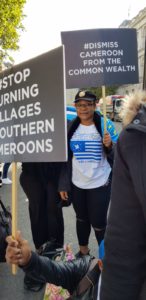The Anglophone crisis is a conflict in the Anglophone southern Cameroons region of Cameroon with separatists fighting against the government of Cameroon. It is a long standing Anglophone problem in Cameroon.
Before 1961, southern Cameroons were a British administered territory from Nigeria. They elected to join the republic of Cameroon by UN Plebiscite in 1961 around the time of decolonisation.
A power sharing agreement was reached; the executive branch of the government was meant to be shared by Anglophones and Francophones but the agreement has not been respected and over the years Anglophone political representation has been steadily eroded.
The crisis came to light in October 2016 when lawyers and teachers led protest in towns and cities demanding that the integrity of their professional institutions be protected and minority right be respected.
As a result of these protests, the Cameroon government responded with reprisals, arrest, torture and detention of these Anglophone protesters.
The Paul Biya regime accuses some Anglophones of wanting to secede to create a new state thus making themselves outlaws. All it takes is to look back at the history of Cameroon to understand that it is not a matter of secession. It is about reclaiming a right granted to them by the UN, 57 years ago. Actually we can only talk of secession when the state we want to separate from was a single bloc at a time of its creation (Independence).
However in Cameroon, when the former east Cameroon under the French mandate acquired her independence on the 1st of January 1960, the former west Cameroon under the British mandate was still fighting for her own independence. Thus on February 11th 1961, the UN organised a referendum in the northern part of west Cameroon, which agreed to join Nigeria, and in the southern part (current Anglophone region of Cameroon) which chose to join the republic of Cameroon (former East Cameroon under the French mandate).
On April 21st 1961, in resolution 1608, the 994th General assembly of the United Nations, with respect to southern Cameroon stated that; the trusteeship agreement of December 13th 1946 is terminated. This implies that southern Cameroon acquired her independence then.
Thereafter the government of southern Cameroons and the authorities of la Republique du Cameroun agreed on terms to come together. But ever since they came together, their living together has been that of mistrust as the then president of la republique du Cameroon Ahmadu Ahidjo manipulated over the federal constitution in violation of article 47 of the said constitution which prohibited any revision of the federal form of the state.
Furthermore, his successor Paul Biya modify the constitution and in January 1984 the united republic of Cameroon was changed to the republic of Cameroon .The change has resulted in the objectification of the Anglophones part of the country and the people’s feeling of being marginalised.
Therefore the Anglophones believe that they are being neglected by the republic of Cameroon and wanted to go back to where they were on April 21 and before 1st October 1961; An independent state.
The fight for the return of an independent southern Cameroon began in October 2016 before the dictatorial and barbaric regime of Paul Biya began suppressing and pushing the advocates of the Anglophone cause to react just as violently.
The government of Cameroon has been using brute force on these separatists resulting to uncountable deaths on both military and civilian population.
The Role Of The SCNC in The Anglophone Crisis
The Southern Cameroon National Council (SCNC) has played a vital role in fighting for the restoration of independence for the British southern Cameroon. The SCNC is a non violent organisation which does not believe on violence in achieving its goal.
Because the SCNC advocates for separation from Cameroon, it has been declared an illegal organisation by the government of President Paul Biya. Security forces regularly interrupt SCNC meetings, arresting members and detaining them for several days, months or years before released. Some have even died in prison due to poor living conditions.
In 1995, the SCNC rose to political prominence with host of efforts to push for separation of the Anglophone southern Cameroons from the country of Cameroon. The government of Cameroon was finishing its application to join the Commonwealth of Nations and the SCNC organised a number of publicity activities to oppose this inclusion.
In august 1995, the SCNC Petitioned the UN to intervene and mediate between them and the government of Cameroon warning that a lack of intervention would create another Somalia.
Repression of this group increased significantly in 2001 when the organisation was declared illegal and clashes with police at a demonstration resulting in multiple deaths.
As a result of this, multiply branches of SCNC have been created in the Diaspora and a good example is the creation of SCNC UK which has been playing a great role in achieving the restoration of independence of southern Cameroons.
Several demonstrations have been organised by SCNC UK to internationalize its activities and to create awareness of the plight of the people of southern Cameroons.


